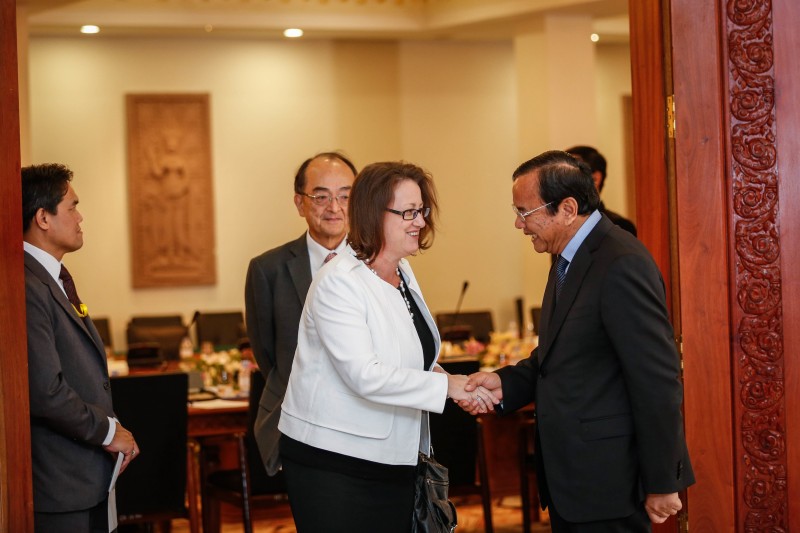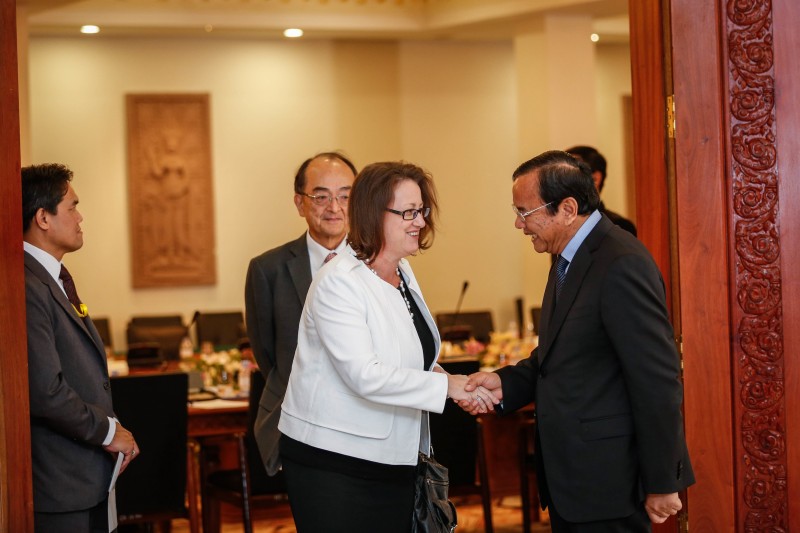Provocations from the opposition over the past two years left the ruling CPP “no choice” but to use the courts to preserve peace in the country, Foreign Affairs Ministry Secretary of State Ouch Borith argued at the close of a three-day summit with representatives of the E.U. on Wednesday.
Seemingly unconvinced by Mr. Borith, the E.U. released a statement calling for the release of rights workers who are among more than 20 government critics jailed over the past year in cases that have also ensnared opposition lawmakers.

In his concluding remarks at the 9th E.U.-Cambodia Joint Committee meeting in Phnom Penh, Mr. Borith said the government was forced to make the arrests to maintain the social stability that Prime Minister Hun Sen had brought to the country after the Khmer Rouge fell from power.
“Our unique history made ‘peace and stability’ the core value to be preserved at all cost,” Mr. Borith said, according to a transcript of his speech.
But in the wake of the disputed 2013 national election, the opposition CNRP shattered the goodwill built by the CPP over the years, he added.
“For the sake of peace, political stability and socio-economic development in Cambodia, the CPP has provided huge political concession to the CNRP by allowing it to have equal members to the NEC [National Election Committee] and chairmanship of some National Assembly Commissions,” Mr. Borith said.
“It is with deep regret that CNRP persistently violated the terms of ‘Culture of Dialogue’ through its leaders’ unethical and provocative behaviors and incitements inside and outside the country, thus leaving CPP no choice but to resort to legal settlements in order to enhance the rule of law in Cambodia,” he said.
On Monday, the Phnom Penh Municipal Court charged and jailed NEC deputy secretary-general Ny Chakrya and four senior officers from local rights group Adhoc for allegedly bribing a mistress of deputy opposition leader Kem Sokha to lie about the alleged affair. A local U.N. official has been charged in absentia.
In its statement released on Wednesday, the E.U. said it had called for a return to the culture of dialogue and the release of the rights workers during their meeting with the government.
“We raised our concerns about the independence of the judiciary and the fairness of law enforcement, and specifically about the recent arrests of civil society representatives, and we called for their release,” the statement said.
Over the past year, the E.U.’s critiques of the government have stood out for their directness among the delicately worded statements issued by other foreign diplomatic missions.
In May last year, visiting E.U. representative Silvio Gonzato warned that it would be hard to justify the $435 million pledged to Cambodia through 2020 to European taxpayers if the bloc did not see significant electoral reforms. Last month, members of the parliament’s human rights subcommittee warned that Cambodia had strayed from its “road to democracy.”
Chak Sopheap, executive director of the Cambodian Center for Human Rights, said on Thursday that she was hopeful the E.U.’s stance would draw support from the larger international community.
“While I think the comments could be stronger, I do believe that strong public statements from influential international actors can provide protection to Cambodian human rights defenders,” she said in an email on Thursday.
Not everyone was convinced.
“Talk is cheap,” said Sophal Ear, an associate professor at Occidental College in Los Angeles and the author of “Aid Dependence in Cambodia.”
“They also talked before the Khmer Rouge rose to power. I am sure that they are busy now furiously typing cables to their headquarters in world capitals,” he said in an email.
Mr. Ear said that only targeted sanctions would get the government’s full attention.
“It takes saying you can’t come to Europe anymore for your shopping sprees in Paris and Geneva…. You are not welcome,” he said.
Political analyst Ou Virak said that businessmen with close ties to the CPP would be particularly riled by sanctions, but that such measures were unlikely unless the political situation deteriorated dramatically.
“That’s why people like myself have been trying to get the government to come back to reality and institute reforms,” Mr. Virak said.
“The donors have an obligation to make sure the government gets the message now, before things get too ugly.”




